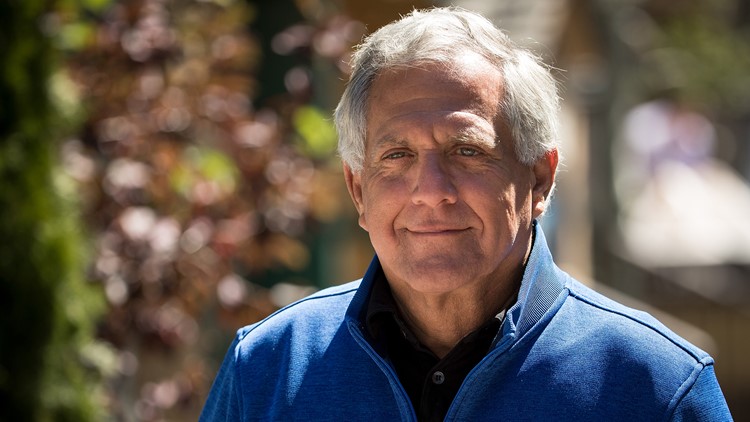Les Moonves, the shamed ex-CEO of CBS, will not get his $120 million severance package, CBS announced late Monday, citing his failure to "cooperate fully" with an internal investigation of allegations of sexual misconduct against him.
In a statement, the network said the board of directors had completed its investigation of Moonves' alleged behavior, plus its investigations of CBS News and "cultural issues" at the network.
"With regard to Mr. Moonves, we have determined that there are grounds to terminate for cause, including his willful and material misfeasance, violation of Company policies and breach of his employment contract, as well as his willful failure to cooperate fully with the Company’s investigation. Mr. Moonves will not receive any severance payment from the Company," the statement said.
A lawyer for Moonves, 69, Andrew Levander, dismissed the decision as "foreordained" and "without merit," in a statement to USA TODAY.
"Consistent with the pattern of leaks that have permeated this 'process,' the press was informed of these baseless conclusions before Mr. Moonves, further damaging his name, reputation, career and legacy," Levander said in the statement. "Mr. Moonves vehemently denies any nonconsensual sexual relations and cooperated extensively and fully with investigators."
Moonves is married to network star Julie Chen, 48, who left the daytime show "The Talk" after the allegations against Moonves surfaced, to spend more time with him and their young son. But she remains the host of "Big Brother: Celebrity Edition," which airs its second season on CBS starting Jan. 21 (8 EST/PST).
The network's investigative team, headed by members of two New York law firms, also concluded that harassment and retaliation are "not pervasive at CBS," but that "past incidents" cited by employees showed that some high-level people at the network were not held accountable for their bad conduct.
"The investigators learned of past incidents of improper and unprofessional conduct, and concluded that the company’s historical policies, practices and structures have not reflected a high institutional priority on preventing harassment and retaliation," the statement said.
Resources devoted to human resources, training and development, and to diversity and inclusion have been "inadequate" for the size and complexity of CBS, the investigation found.
"Employees also cited past incidents in which HR and the Company did not hold high performers accountable for their conduct and protect employees from retaliation," the statement said.
The board of directors, which includes six new members, and the new management have already begun to take "robust steps" to improve the working environment, the statement said.
Among other things, a new "Chief People Officer" is working to enhance and re-imagine human resources functions, and "has retained outside expert advisers to develop other initiatives for promoting a workplace culture of dignity, transparency, respect and inclusion," the statement said.
The board promised these efforts would continue to be a high priority.
"We would like to thank everyone who cooperated with the investigation and applaud CBS’ employees for remaining focused on their jobs during this very difficult time," the statement concluded. "We look forward to the people of CBS returning their full attention to the outstanding work that they do every single day."
Approving tweets from Hollywood activists in the #MeToo and Time's Up movements began rolling in.
"In the American entertainment industry, this is one of those headlines you would have never imagined a year ago. #TimesUp," tweeted director Ava DuVernay.
The decision was hailed by a group of activists against sexual assault and sexual harassment, who had called for Moonves to be fired. Shaunna Thomas, co-founder and executive director of UltraViolet, called the decision a "huge victory" for survivors of sex crimes.
"This decision shows that across corporate America, the tides are turning, and the new norm is that if you abuse women, you will lose your job and your golden parachute," Thomas said in a statement. "While CBS still has a long way to go to fully rid itself of the toxic culture of abuse that Moonves perpetuated, this is a strong step in the right direction.”
Moonves, once the most powerful media executive in American television, was pushed out of his position in September after a dozen women accused him of sexual misconduct and intimidation in a bombshell investigation published by The New Yorker.
His golden parachute looked even more imperiled in late November when The New York Times posted a lengthy story describing how he allegedly forced oral sex on a young actress years ago and then worked with her down-and-out agent to get her roles to keep her quiet after the #MeToo movement exploded.
Under his employment contract, the network would not have to pay Moonves severance if the investigation found evidence that he did not tell the full truth about whether he tried to pay off an accuser with job offers and then tried to hide it.
Tim Hubbard, assistant professor of management in the University of Notre Dame’s Mendoza College of Business, said there should be no surprise about the CBS board's decision.
"The company has been entangled in sexual harassment controversies and must try to bring back its reputation," Hubbard said. "CBS had to send a signal to employees and other stakeholders that these actions will not be tolerated within the company."
He said this action should serve as a signal that the public and boards are fed up with the pile-up of allegations of sexual misconduct from executives.
"Hopefully, such a large penalty will start to change the culture of CBS – and firms across the world," Hubbard said.
Moonves' severance, if he had received it, would have been less $20 million: Last week CBS pledged $20 million to 18 organizations dedicated to eliminating sexual harassment in the workplace, as part of the network's effort to recover from the scandal.
The move in part stemmed from another bombshell revelation uncovered by the investigation of the culture at CBS. According to the network, CBS secretly paid "Bull" actress Eliza Dushku a $9.5 million settlement after Dushku complained about feeling "violated" and "uncomfortable" on the set of the series by jokes and remarks made by series star Michael Weatherly.
When she confronted him, she claimed, she was written out of the series in retaliation. The settlement reflected what Dushku would have made had she stayed on as a series regular.
The money for the anti-harassment organizations, the network said, came out of Moonves' severance.



